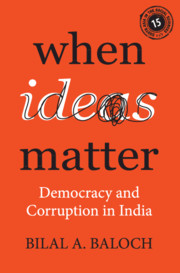Book contents
- Frontmatter
- Dedication
- Contents
- List of Table
- Preface
- Acknowledgments
- List of Abbreviations
- 1 Introduction
- 2 A Constructivist Approach to Political Behavior in India
- 3 The Emergency and the Jayaprakash Narayan Movement
- 4 India under Gandhi: Populism and Partisans
- 5 Checks and Balances and the India Against Corruption Movement
- 6 United Progressive Alliance: Technocrats and Transformations
- 7 The Politics of Ideas in India and Developing Democracies
- Appendices
- Bibliography
- Index
2 - A Constructivist Approach to Political Behavior in India
Published online by Cambridge University Press: 30 June 2021
- Frontmatter
- Dedication
- Contents
- List of Table
- Preface
- Acknowledgments
- List of Abbreviations
- 1 Introduction
- 2 A Constructivist Approach to Political Behavior in India
- 3 The Emergency and the Jayaprakash Narayan Movement
- 4 India under Gandhi: Populism and Partisans
- 5 Checks and Balances and the India Against Corruption Movement
- 6 United Progressive Alliance: Technocrats and Transformations
- 7 The Politics of Ideas in India and Developing Democracies
- Appendices
- Bibliography
- Index
Summary
In decisive historical moments, political capacity (which includes organization, will, and ideologies) is necessary to enforce or to change a structural situation. Intellectual evaluation of a given situation and ideas about what is to be done are crucial in politics.
—Fernando Henrique Cardoso and Enzo Faletto, 1979It is a paradox that scholars, whose entire existence is centered on the production and understanding of ideas, should grant ideas so little significance for explaining political life.
—Kathryn Sikkink, 1991Ideas and Institutional Politics in India
The behavior of decision-making elites during credibility crises in India and other developing democracies should be considered through a constructivist framework. Existing explanations provide inadequate answers to the questions posed by these crises. Contemporary approaches are either over-reliant on external, material interests that shape decision-making, such as the literature on corruption and political economy; or are underspecified, such that empirical correlations may prove consistent with several alternative interpretations of underlying explanatory mechanisms, such as the literature on democracy and authoritarianism. Rather than considering Indian politics as a contest among competing figures with clear and stable objective interests, who then develop strategies to pursue those interests, this chapter develops a vision of Indian politics as a struggle for power and control among decision-making elites who are motivated by myriad ideas. These ideas include elites’ conceptualization of the nation and technical diagnoses of social and economic development.
We will consider the questions explored in this book through an analytical framework that incorporates advances in both historical and discursive institutionalism in political science, as well as insights ranging from economic sociology to behavioral psychology and neuroscience. This will allow for the theorization of the interactions between ideas, human agents, and political and state structures. In the main, the introduction of ideas into traditional historical institutionalist approaches attends to who talks to whom, where, and when, and by charting the formal and informal institutional contexts that shape interactive patterns of discursive power, especially at the executive level. This interactive framework facilitates two core propositions for the book's argument.
First, in most developing democracies, state institutions are not neutral decision-making apparatuses, but rather reflect government decision-makers’ perspectives and power. As such, state institutions a re contestable social settings whose structural logic differs according to the specific sets of ideas competing for policymaking influence.
- Type
- Chapter
- Information
- When Ideas MatterDemocracy and Corruption in India, pp. 16 - 52Publisher: Cambridge University PressPrint publication year: 2021



